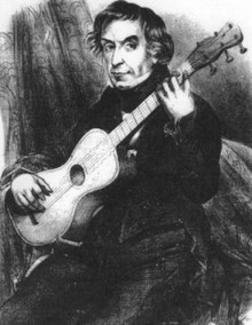This Week in Classical Music: November 7, 2022.Brief Italian entry 2.We’re still under the Italian spell, but this week it’s harder to maintain the Italian theme: we have only one Italian composer, and, unfortunately, rather mediocre – Luigi Legnani, born on November 7th of 1790 in Ferrara.He started as a tenor but switched to playing the guitar when he was almost 30.He turned out to be very good at that: after making a name for himself in Italy, he went to Vienna in 1822 and performed there to great acclaim.Critics calling him a worthy successor to Mauro Giuliani, another Italian, a virtuoso guitar player and composer, who spent many years in Vienna, built a highly successful career and made friends with Beethoven, Rossini and members of the Imperial court.Legnani toured many European countries and at some point, met Paganini, himself an excellent guitar player.They became friendly and even planned a concert together but at the last moment Paganini got sick.Legnani composed about 250 works, most of them for the guitar.Later in life he settled in Ravenna where he built fine guitars and violins. Here is Luigi Legnani's Capriccio no. 28, op. 20, played by the Italian guitarist Federica Canta.
Our second Italian, Giuseppe Sinopoli, was a very talented (and unorthodox) conductor and composer.Born on November 2nd of 1946 in Venice, he studied with Bruno Maderna, one of most prominent Italian modernist composers, and later with Karlheinz Stockhausen in Darmstadt.In 1975 Sinopoli formed the Bruno Maderna Ensemble to perform contemporary music; in 1978 he conducted his first opera, Aida, in Venice.During that period, he composed an opera, Lou Salomé, which was staged in Munich in 1981.He later dropped composing and devoted himself to conducting.Sinopoli’s career developed rapidly: in 1983 he became the Chief conductor of the Academy of Santa Cecilia in Rome, went on to conduct the New York Philharmonic and Philharmonia Orchestra from London, worked at the Bayreuth Festival.In 1990 he was appointed to the prestigious position of music director at the Berlin Deutsche Oper but didn’t take it, moving instead to Dresden’s Staatskapelle as their principal conductor.Sinopoli died on April 20th of 2001 of a heart attack while conducting the third act of Aida at the Deutsche Oper.Here’s Giuseppe Sinopoli conducting the Staatskapelle Dresden orchestra in the first movement of Bruckner’s Symphony no. 5.
Brief Italian entry 2, 2022
This Week in Classical Music: November 7, 2022. Brief Italian entry 2. We’re still under the Italian spell, but this week it’s harder to maintain the Italian theme: we have only one Italian composer, and, unfortunately, rather mediocre – Luigi Legnani, born on November 7th of 1790 in Ferrara. He started as a tenor but switched to playing the guitar when he was almost 30. He turned out to be very good at that: after making a name for himself in Italy, he went to Vienna in 1822 and performed there to great acclaim. Critics calling him a worthy successor to Mauro Giuliani, another Italian, a virtuoso guitar player and composer, who spent many years in Vienna, built a highly successful career and made friends with Beethoven, Rossini and members of the Imperial court. Legnani toured many European countries and at some point, met Paganini, himself an excellent guitar player. They became friendly and even planned a concert together but at the last moment Paganini got sick. Legnani composed about 250 works, most of them for the guitar. Later in life he settled in Ravenna where he built fine guitars and violins. Here is Luigi Legnani's Capriccio no. 28, op. 20, played by the Italian guitarist Federica Canta.
composer, and, unfortunately, rather mediocre – Luigi Legnani, born on November 7th of 1790 in Ferrara. He started as a tenor but switched to playing the guitar when he was almost 30. He turned out to be very good at that: after making a name for himself in Italy, he went to Vienna in 1822 and performed there to great acclaim. Critics calling him a worthy successor to Mauro Giuliani, another Italian, a virtuoso guitar player and composer, who spent many years in Vienna, built a highly successful career and made friends with Beethoven, Rossini and members of the Imperial court. Legnani toured many European countries and at some point, met Paganini, himself an excellent guitar player. They became friendly and even planned a concert together but at the last moment Paganini got sick. Legnani composed about 250 works, most of them for the guitar. Later in life he settled in Ravenna where he built fine guitars and violins. Here is Luigi Legnani's Capriccio no. 28, op. 20, played by the Italian guitarist Federica Canta.
Our second Italian, Giuseppe Sinopoli, was a very talented (and unorthodox) conductor and composer. Born on November 2nd of 1946 in Venice, he studied with Bruno Maderna, one of most prominent Italian modernist composers, and later with Karlheinz Stockhausen in Darmstadt. In 1975 Sinopoli formed the Bruno Maderna Ensemble to perform contemporary music; in 1978 he conducted his first opera, Aida, in Venice. During that period, he composed an opera, Lou Salomé, which was staged in Munich in 1981. He later dropped composing and devoted himself to conducting. Sinopoli’s career developed rapidly: in 1983 he became the Chief conductor of the Academy of Santa Cecilia in Rome, went on to conduct the New York Philharmonic and Philharmonia Orchestra from London, worked at the Bayreuth Festival. In 1990 he was appointed to the prestigious position of music director at the Berlin Deutsche Oper but didn’t take it, moving instead to Dresden’s Staatskapelle as their principal conductor. Sinopoli died on April 20th of 2001 of a heart attack while conducting the third act of Aida at the Deutsche Oper. Here’s Giuseppe Sinopoli conducting the Staatskapelle Dresden orchestra in the first movement of Bruckner’s Symphony no. 5.